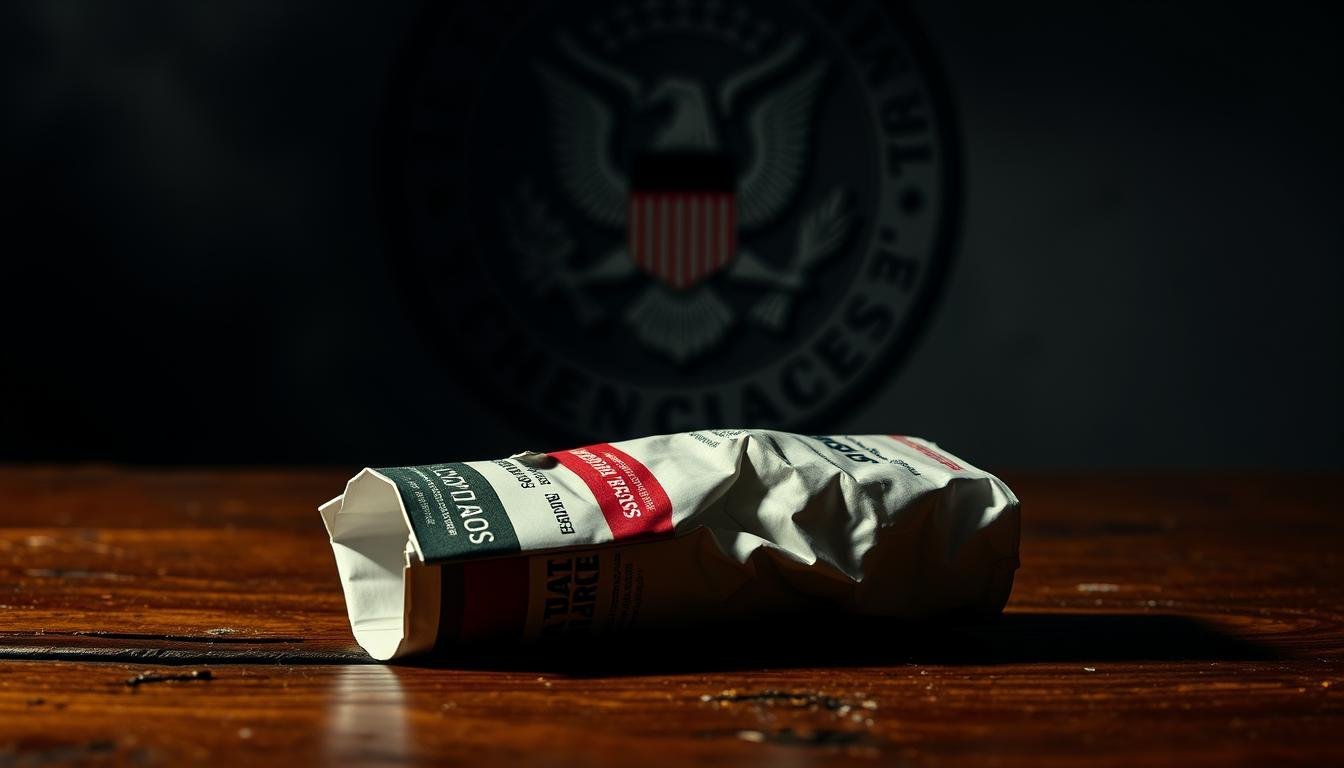Have you wondered about candy cigarettes in Japan? These confectioneries have caused a stir globally. They look like real cigarettes and might affect kids’ views on smoking.
The debate on candy cigarettes has been going on for years. Many places are thinking twice about these sweets. By looking into their history, cultural importance, and legal status in Japan, you’ll learn if they’re banned.
Knowing the rules on candy cigarettes in Japan helps us understand the country’s efforts to control smoking products.
Contents
- 1 The History of Candy Cigarettes
- 2 Candy Cigarettes in Japanese Culture
- 3 Is Candy Cigarettes Banned in Japan? The Legal Status
- 4 Controversy Surrounding Candy Cigarettes
- 5 Japanese Consumer Response to Candy Cigarettes
- 6 Comparison with Other Countries’ Regulations
- 7 Modern Alternatives to Candy Cigarettes in Japan
- 8 Conclusion
- 9 FAQ
- 9.1 Are candy cigarettes still available for purchase in Japan?
- 9.2 What are the concerns surrounding candy cigarettes in Japan?
- 9.3 Have there been any legislative actions taken to ban candy cigarettes in Japan?
- 9.4 How do other countries regulate candy cigarettes compared to Japan?
- 9.5 What are some modern alternatives to candy cigarettes in Japan?
- 9.6 How has the Japanese public responded to candy cigarettes over the years?
- 9.7 What is the cultural significance of candy cigarettes in Japan?
- 9.8 Are candy cigarettes a significant contributor to smoking initiation among children in Japan?
The History of Candy Cigarettes
Candy cigarettes have been around for many years. They were once seen as a fun treat that looked like real cigarettes. This was part of the tobacco industry’s marketing plans.
In the mid-20th century, candy cigarettes were marketed as a safe choice for kids. But as worries about smoking grew, so did the criticism of these candies. People said they made smoking seem okay for kids.
Today, candy cigarettes are seen as old-fashioned. Their link to tobacco raises questions about controlling tobacco use. Knowing their history helps us understand why they’re regulated now.
Candy Cigarettes in Japanese Culture
Candy cigarettes were once a big deal in Japan. They mixed fun with a nod to adult habits. Kids got them as a treat, like adults smoking real cigarettes.
In Japan, candy cigarettes had a double meaning. They were fun for kids but also showed a link to smoking. As people learned more about tobacco dangers, worries about candy cigarettes grew.
Impact on Children
Candy cigarettes can harm kids. They might make kids want to smoke real cigarettes later. Studies say seeing smoking in candy form can lead to smoking among young people.
Japan is still figuring out its smoking culture. Candy cigarettes remind us of the health vs. culture debate. It shows we need to think hard about how culture affects our health.
Is Candy Cigarettes Banned in Japan? The Legal Status
Many wonder if candy cigarettes are banned in Japan, especially since they might influence kids. The rules around these candies are complex. They involve many laws and actions to limit their sale and spread.
In Japan, candy cigarettes aren’t completely banned. But, they’re watched closely by laws. The Health Promotion Act and other laws have rules that affect candy cigarettes. For example, there are limits on how they can be packaged and advertised to keep them away from kids.
Legislative Actions
Japan has taken steps to limit candy cigarettes. Some of these steps include:
- Proposals to ban candy cigarettes near schools
- Rules on packaging to make them less appealing to kids
- Limitations on ads in media popular with children
Even with these efforts, candy cigarettes are still sold in Japan. The debate is about finding a balance. It’s about allowing sales while protecting kids from the influence of these candies. This shows how complex the rules are, tied to public health and consumer safety in Japan.
The laws today let candy cigarettes be sold, but with strict rules. For instance, makers must make sure their products don’t look too much like real cigarettes. They also can’t market them to kids.
Controversy Surrounding Candy Cigarettes
The debate over candy cigarettes centers on whether they contribute to the normalization of smoking among young people. Some argue that these candies encourage children to mimic smoking behavior. This could lead to a lifelong habit.
Candy cigarettes are seen by many as a gateway to actual smoking, as they normalize the act of smoking for children. Others argue that candy cigarettes are harmless. They say banning them would be an overreach of regulatory power.
Public Debate
The public debate surrounding candy cigarettes is multifaceted. It involves parents, health experts, and policymakers. Health concerns are at the forefront, with many arguing that candy cigarettes trivialized smoking and made it more appealing to children.
Those in favor of stricter regulations on candy cigarettes point to the importance of tobacco control measures. They argue that banning or restricting candy cigarettes can significantly reduce smoking rates among young people.
The controversy highlights the need for a balanced approach. It must consider both the potential health risks associated with candy cigarettes and the rights of consumers to access certain products.
Japanese Consumer Response to Candy Cigarettes
In Japan, as people learn more about smoking dangers, candy cigarettes are getting more attention. You might be curious about how people in Japan see these old treats. Opinions vary, showing how society views smoking and health.
Some folks see candy cigarettes as just a fun memory from their childhood. Others worry they might encourage kids to start smoking. This mix of views is seen in sales, which have dropped in some places as health messages spread.
A survey in Japan about candy cigarettes showed some interesting points. Here’s what it found:
| Age Group | Positive View | Negative View |
|---|---|---|
| 18-24 | 30% | 60% |
| 25-44 | 40% | 50% |
| 45+ | 50% | 30% |
The survey shows younger people are more likely to dislike candy cigarettes. But older folks tend to miss the old days. This shows that how we feel about these treats changes with age and what we learn about health.
As Japan’s people think more about candy cigarettes, makers are changing their products. They want to make them more appealing to those who care about health.
Comparison with Other Countries’ Regulations
Candy cigarettes are regulated differently around the world. Each country has its own way of handling them. This creates a diverse range of approaches globally.

In some places, candy cigarettes are banned because they might encourage kids to smoke. Countries with tough tobacco laws often include candy cigarettes in their rules. Some nations also run education campaigns to warn about the dangers of candy cigarettes.
Regulatory Approaches
Many countries have different ways to regulate candy cigarettes. These methods can be grouped into several types:
- Complete bans on the sale and distribution of candy cigarettes
- Restrictions on the packaging and labeling of candy cigarettes
- Regulations on the sale of candy cigarettes near schools or other areas where children are present
For example, some countries ban candy cigarettes completely. Others have rules about how they are packaged and labeled. The success of these methods is debated, as there’s no clear best way to regulate candy cigarettes.
An international comparison of these rules shows how complex the issue is. Looking at different approaches helps us understand the challenges and opportunities in regulating these products.
Modern Alternatives to Candy Cigarettes in Japan
In Japan, the debate over candy cigarettes has sparked new ideas. These alternatives aim to give kids safer choices that look like smoking but don’t have the health risks.
Herbal or tea-based sticks are one such option. They look like cigarettes but are made from natural stuff. They’re a hit with parents who want safer choices for their kids.
Another choice is candy or gum that looks like smoking products but is safe to eat. Makers are working on fun, safe products. They use kid-friendly flavors and avoid tobacco looks.
People seem to like these new options. Both users and officials see the effort to make things safer. But, there’s still talk about if these products really help keep kids away from smoking.
Conclusion
You now understand the complex issue of candy cigarettes in Japan. We’ve looked at their history and cultural importance. We’ve also checked their legal status.
The controversy and how people react to candy cigarettes are clear. Changes in rules and what people think will keep happening. This will affect how candy cigarettes are sold and given out in Japan.
In the future, Japan will likely move towards new, modern sweets. This will follow global trends and new laws. Japan’s handling of candy cigarettes is a lesson for other countries facing similar problems.
FAQ
Are candy cigarettes still available for purchase in Japan?
Yes, you can still buy candy cigarettes in Japan. But, there are rules about their sale.
What are the concerns surrounding candy cigarettes in Japan?
People worry that candy cigarettes might make kids want to smoke. They also think it makes tobacco seem okay.
Have there been any legislative actions taken to ban candy cigarettes in Japan?
Yes, there have been moves to control or ban candy cigarettes in Japan. But, the laws right now let them be sold under some rules.
How do other countries regulate candy cigarettes compared to Japan?
Different countries have different rules for candy cigarettes. Some ban them strictly, while others are more relaxed.
What are some modern alternatives to candy cigarettes in Japan?
In Japan, new products have come out. They look like cigarettes but are safe for kids to play with.
How has the Japanese public responded to candy cigarettes over the years?
Opinions on candy cigarettes in Japan have changed. More people are worried about the dangers of smoking now.
What is the cultural significance of candy cigarettes in Japan?
Candy cigarettes were a big part of Japanese culture, especially for kids. They were seen as a fun, safe treat.
Are candy cigarettes a significant contributor to smoking initiation among children in Japan?
There’s a big debate about candy cigarettes and kids smoking in Japan. Some say they might make kids more likely to start smoking.

Marcellus Stark is an investigative journalist from San Francisco, USA. He writes about global bans, rules, and unusual laws. He shares clear, interesting, and well-researched stories that help readers understand surprising facts worldwide.

